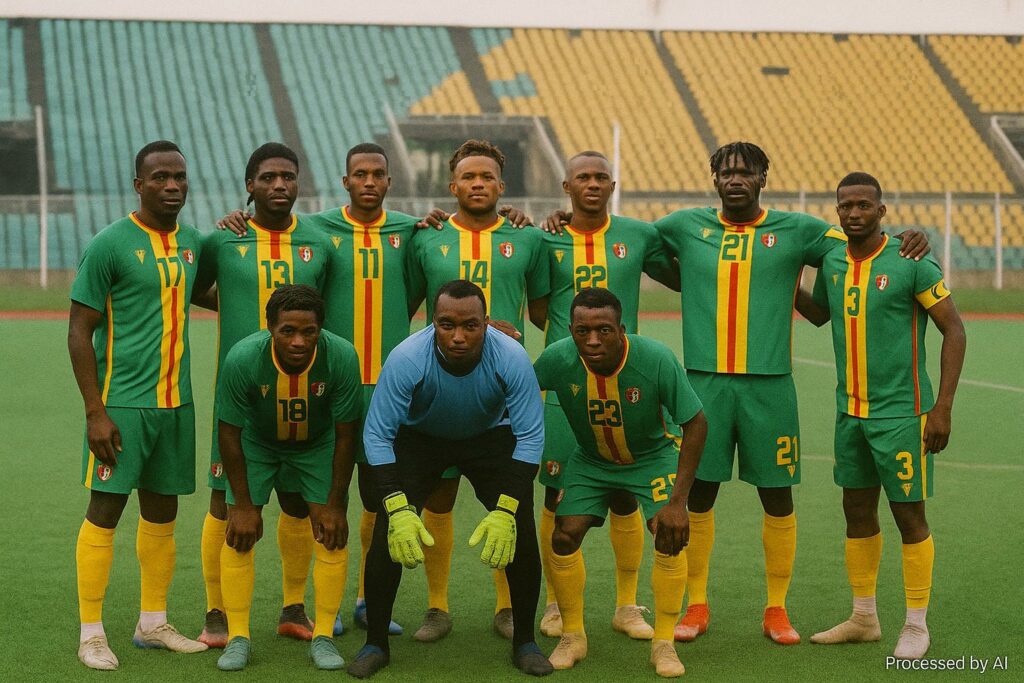A Record of Reliability in Continental Competition
In the often-volatile landscape of African football, the Republic of Congo has nurtured a rare virtue: regularity. Since the 2018 edition of the African Nations Championship, the Diables Rouges A’ have checked into every continental camp, marking four consecutive appearances and five in total. Only a handful of federations can claim comparable persistence, a point quietly acknowledged by observers at the Confederation of African Football (CAF) who see Congo as a “pillar of continuity” in a tournament designed exclusively for domestically based players. The challenge now is to translate presence into podium, for the Brazzaville delegation has twice been halted on the brink—eliminated in the quarter-final lottery of penalties in both 2018 and 2022.
Discreet Preparation, Determined Intent
The delegation’s scheduled departure for Zanzibar, by way of Dar es Salaam, comes without the usual fanfare of an international friendly series. Head coach Barthélémy Ngatsono, retained for a third cycle, opted for closed-door scrimmages in Brazzaville rather than transcontinental travel. “We prefer to preserve competitive mystery and physical freshness,” he explained during the squad unveiling, before adding that “our tactical plan for Sudan, Senegal and Nigeria has been rehearsed in detail; the rest is application.” Such prudence, while denying external benchmarking, spares the players the fatigue of long-haul fixtures and reflects budgetary discipline applauded by the Ministry of Sports.
Group D: Football and the Politics of Place
Zanzibar’s Amaan Stadium will host a quadrilateral rich in football pedigree and geopolitical undertones. Sudan, navigating a difficult domestic situation, arrives under a unity banner that transcends internal fault lines. Senegal, reigning African champion in the senior category, projects depth in every stratum of its football pyramid. Nigeria, buoyed by an expanding domestic league and a vast diaspora of scouts, seldom travels without expectation. For Congo, therefore, the opening fixture against Sudan on 5 August carries disproportionate weight; history shows that Brazzaville sides grow noticeably in conviction once the first points are banked. CAF statisticians note that Congo has secured victory in just one of its last four CHAN curtain-raisers, yet has rarely faltered in subsequent group matches—a behavioural pattern Ngatsono says he has “studied and contextualised” for his squad.
Domestic Talent as a Strategic Asset
The final list of twenty-five reveals a carefully balanced spine. Goalkeeper Simon Ulrich Samba, a vocal organiser, anchors a back line where Divin Pachoud de Nzingoula’s aerial authority complements the ball-carrying instincts of Van Igor Boukaka. Midfield dynamism will rely on Brudet Vigel Okana and the industrious Grace Euphrate Nsemi, while the attacking trident is expected to pivot around the pace of Elie Ondzouono. Crucially, every selected player plies his trade in the national championship, a fact that turns the CHAN into a live audition for scouts from North Africa, Europe and the Gulf. “Let them first play for their own careers,” Ngatsono urged, echoing a sentiment widespread among African coaches who view CHAN as both competition and employment fair.
Soft-Power Stakes for Brazzaville
Beyond the chase for silverware, Brazzaville’s leadership recognises the intangible dividends of sporting visibility. A semifinal berth would coincide neatly with ongoing efforts to market the Congo as a stable destination for investment and cultural tourism. Diplomatic envoys stationed in Dar es Salaam hint that high-level delegations from several Central African states will attend group fixtures, leveraging the tournament’s first-ever tri-nation format—in Tanzania, Uganda and Kenya—as a platform for informal dialogue on regional infrastructure and security. Within such an arena, the performance of the Diables Rouges becomes part of a broader narrative of nation branding.
Looking Ahead with Measured Confidence
Congo’s quest in Zanzibar is neither flamboyant nor tentative; it is quietly methodical. Whether this calibrated approach will finally breach the semifinal ceiling remains to be seen, yet indications from training suggest a collective aware of its historical window. In Ngatsono’s words, “discipline is our margin for progress.” For a squad accustomed to navigating the fine line between promise and fulfilment, discipline might indeed be the surest passport to late-tournament football—and to the soft-power capital that accompanies it.

